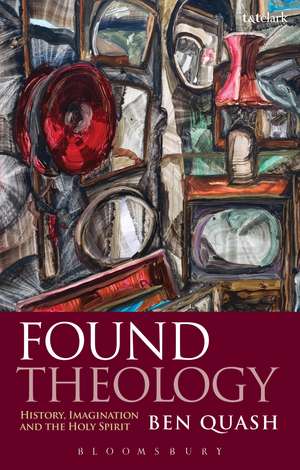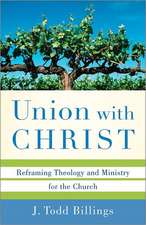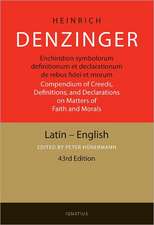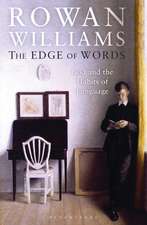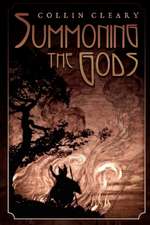Found Theology: History, Imagination and the Holy Spirit
Autor Ben Quashen Limba Engleză Paperback – 18 dec 2013
Preț: 219.39 lei
Preț vechi: 245.64 lei
-11% Nou
Puncte Express: 329
Preț estimativ în valută:
41.99€ • 43.37$ • 34.94£
41.99€ • 43.37$ • 34.94£
Carte tipărită la comandă
Livrare economică 26 martie-09 aprilie
Preluare comenzi: 021 569.72.76
Specificații
ISBN-13: 9780567517920
ISBN-10: 0567517926
Pagini: 336
Ilustrații: 2 illus
Dimensiuni: 138 x 216 x 30 mm
Greutate: 0.43 kg
Ediția:New.
Editura: Bloomsbury Publishing
Colecția T&T Clark
Locul publicării:London, United Kingdom
ISBN-10: 0567517926
Pagini: 336
Ilustrații: 2 illus
Dimensiuni: 138 x 216 x 30 mm
Greutate: 0.43 kg
Ediția:New.
Editura: Bloomsbury Publishing
Colecția T&T Clark
Locul publicării:London, United Kingdom
Caracteristici
An unusual and ground-breaking exercise in the interdisciplinary discussion of theology and the arts
Notă biografică
Ben Quash is the first occupant of the Chair in Christianity and the Arts at King's College London, UK. He has been there since 2007, and prior to that was Dean and Fellow of Peterhouse in the University of Cambridge, UK, where he was also Academic Convenor of the Cambridge Inter-Faith Programme, developing research and public education programmes related to the three Abrahamic traditions of Christianity, Islam and Judaism. He runs an MA in Christianityand the Arts in association with the National Gallery, London, has worked with many arts organisations including the Britten Sinfonia, the Royal Opera House, and the London Festival of Contemporary Church Music, and broadcasts frequentlyon BBC radio. He is a Canon Theologian of both Coventry and Bradford Cathedrals, and was the author of Abiding, the Archbishop of Canterbury's Lent Book 2013.
Cuprins
AcknowledgementsPreface1. Historical FindingPART I2. 'I Will Happen As I Will Happen' (Exodus 3:14)3. MaculationPART II4. 'In My Flesh I Shall See God' (Job 19:26)5. ReceptionPART III6. 'Truly the LORD Is in This Place and I Did Not Know It'7. AbductionPART IV8. Vertiginous At-Homeness(In)conclusionBibliographyIndex
Recenzii
What perhaps makes Found Theology unique is Quash's embrace of that reality and his search for the work of the Holy Spirit within the ongoing processes of history. Quash is concerned with connecting theology to art, science, and interreligious dialogue. He is interested in a method for Christian theology that allows deep and meaningful interaction with these critical contemporary forces. As he proceeds, he opens up large vistas for the future of theology.
Frames and reframes the questions that constructive and pastoral theologians ought to be asking about the Spirit's work . I can imagine no better future for pneumatology than for it to follow Quash's lead.
Quash's monograph provides a stimulating new proposal to the broader conversation about how the dialogue between theology and the arts can proceed. It will be of particular interest to post-graduate researchers in the related fields of Christianity and the arts.
The book succeeds admirably in its ambition to be a groundbreaking exercise in the interdisciplinary discussion of theology, science and the arts. ... Fans of fresh, engaging, well-expressed and richly imagined works of theological enterprise will not be disappointed.
There is a richness and allusiveness to Quash's writing that corroborates that his first studies were in English literature rather than in, for example, philosophy or natural science. As such they are likely to succeed in provoking readers into further thought rather than definitively resolving in which direction they should next proceed.
An important book, Found Theology evinces the patience called for, and no doubt required, if we are to get beyond the given, or, taking the posture of the communicant, to receive the gift given in the found.
Quash's literary background, accompanied by his historical concern, brings a valuable perspective to proceedings . [An] inspired and inspiring work.
Frames and reframes the questions that constructive and pastoral theologians ought to be asking about the Spirit's work . I can imagine no better future for pneumatology than for it to follow Quash's lead.
Quash's monograph provides a stimulating new proposal to the broader conversation about how the dialogue between theology and the arts can proceed. It will be of particular interest to post-graduate researchers in the related fields of Christianity and the arts.
The book succeeds admirably in its ambition to be a groundbreaking exercise in the interdisciplinary discussion of theology, science and the arts. ... Fans of fresh, engaging, well-expressed and richly imagined works of theological enterprise will not be disappointed.
There is a richness and allusiveness to Quash's writing that corroborates that his first studies were in English literature rather than in, for example, philosophy or natural science. As such they are likely to succeed in provoking readers into further thought rather than definitively resolving in which direction they should next proceed.
An important book, Found Theology evinces the patience called for, and no doubt required, if we are to get beyond the given, or, taking the posture of the communicant, to receive the gift given in the found.
Quash's literary background, accompanied by his historical concern, brings a valuable perspective to proceedings . [An] inspired and inspiring work.
